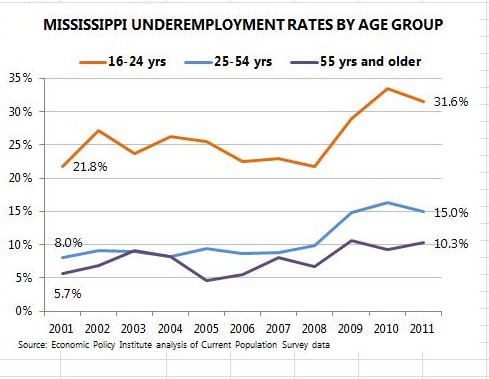October Job Watch
October 5th, 2012
Today, the Bureau of Labor Statistics released the national unemployment rate and job numbers for September. Since August the nation has added 114,000 jobs, and the unemployment rate decreased to 7.8%. The rise in employment is a positive sign for the nation’s labor force; however, concerns linger about the status of Mississippi’s economy.
In August, the national unemployment rate was 8.1% compared to Mississippi’s 9.1%. State leaders continue to note that Mississippi’s consistent, high unemployment is an indicator that Mississippi entered a recession in the first half of 2012. Employment in several sectors, including construction, retail, and government, is well below employment levels of one year ago.*
Last week, MEPC released Mississippi’s poverty rate and median household income for 2011. The condition of the state’s labor market and economy contributed to a decrease in the state’s median income since the start of the decade. In 2011, Mississippi’s median household income registered at $36,919, close to $2,400 below 2001 levels.
What labor force factors contribute to a lack of household income growth?
Too many Mississippi workers continue to experience periods of job loss, cut work hours and stagnant wages. Outside of working adults that are unemployed, there is a large group of workers that work part time but want full-time jobs and are available for full-time work. The underemployment rate measures the portion of workers that work part-time but want full-time work.
Rates of underemployment vary considerably by age. Young workers, those under age 24, are the most likely to be underemployed. In 2011, close to 1 in 3 young adults was underemployed compared to 15% of workers age 25-54 and 10% of workers over 55 years old. The chart illustrates that underemployment has risen among each age group over decade.

Workers can be forced into part-time status for a variety of reasons, particularly during a recession, including: lower demand for work at their company, poor business conditions, or an inability to find a full-time job.** The recent news on household income and Mississippi’s underemployment trends underscore that families experiencing both unemployment and underemployment continue to be affected statewide.
Author: Sarah Welker, Policy Analyst
*Institutions of Higher Learning. University Research Center. Mississippi Business September 2012.
**Sum, Andrew and IshwarKhatiwada. 2010. The Nation’s Underemployed in the “Great Recession” of 2007–09. Bureau of Labor Statistics. http://www.bls.gov/opub/mlr/2010/11/art1full.pdf





